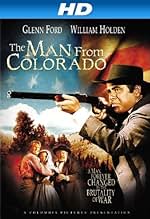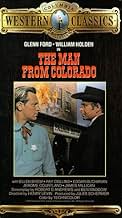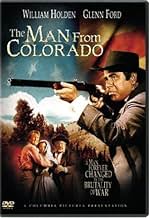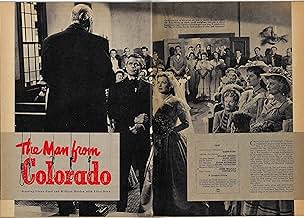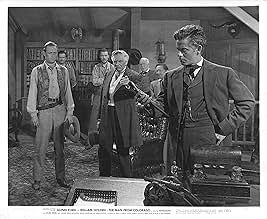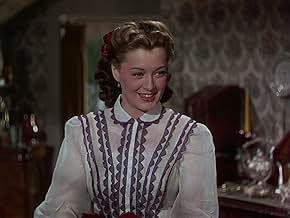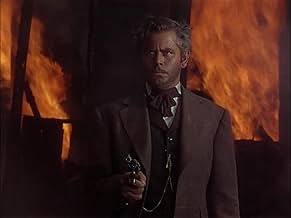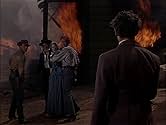IMDb-BEWERTUNG
6,7/10
2115
IHRE BEWERTUNG
Füge eine Handlung in deiner Sprache hinzuAt the end of the Civil War, two friends return home to Colorado and one of them has changed and is violent and erratic.At the end of the Civil War, two friends return home to Colorado and one of them has changed and is violent and erratic.At the end of the Civil War, two friends return home to Colorado and one of them has changed and is violent and erratic.
- Regie
- Drehbuch
- Hauptbesetzung
- Auszeichnungen
- 1 Nominierung insgesamt
William 'Bill' Phillips
- York
- (as Wm. 'Bill' Phillips)
Stanley Andrews
- Roger MacDonald
- (Nicht genannt)
Emile Avery
- Townsman
- (Nicht genannt)
Walter Bacon
- Townsman
- (Nicht genannt)
Walter Baldwin
- Tom Barton
- (Nicht genannt)
Symona Boniface
- Matron
- (Nicht genannt)
Chet Brandenburg
- Party Guest
- (Nicht genannt)
James Bush
- Cpl. Dixon
- (Nicht genannt)
Nora Bush
- Townswoman
- (Nicht genannt)
Boyd Cabeen
- Townsman
- (Nicht genannt)
Empfohlene Bewertungen
The story is a fairly simple one. Col. Glenn Ford and Capt. Bill Holden return with a group of fellow soldiers to their home town after the Civil War has ended. Ford has been a pretty ruthless officer. The town has changed during their three-year absence. Their only source of livelihood were their gold claims, but federal laws converted those claims to private property and the mines were gobbled up by Big Ray Collins.
Collins backs Ford for the post of federal judge, and Ford appoints his best friend Holden as chief lawman. The disappointed ex-soldiers bring their case to Judge Ford who finds in favor of Collins. Judge Ford also marries the girl, Ellen Drew, whom Holden also loves. Well, frankly, the ex-soldiers are thoroughly browned off at the loss of their claims even though Big Ray gives them jobs at a barely livable wage ("digging out our own gold") before firing them. Some of the men become bandits preying on Collins' gold. Some don't. But all of them grow to hate Judge Ford for upholding the law, even coming to his house during a birthday party and insulting him in front of his wife and his guest, the friendly doctor, Ed Buchanan. "I don't blame [Collins]," shouts one of the angry crowd, "I blame you!" Ford throws them out.
The plot gets too complicated to describe in any detail but it can be summed up by saying that Judge Ford slugs Holden for telling him he's "sick inside" (people tell Judge Ford that he's "crazy" so often in this movie that it's no wonder he doesn't believe it). His punishments, while within the law, become outrageous. It isn't so much that he's on the side of Big Ray and the suits. It's that he's on his own trip. The movie ends happily, more or less, with Ford gone and Big Ray destroyed, and Holden riding off to Washington to see that the ex-soldiers and the rest of the town get their just due. He smiles at Allen as he boards the train and tells her, "I'll be back."
It's been pointed out repeatedly that "adult westerns" -- that is, those appearing after everybody started watching cheap Hopalong Cassidy movies on TV -- are a chronicle of their times. {"High Noon" is the most often cited example, although nobody seems quite sure of exactly which point of view the film took.) "The Man from Colorado" is no exception. Released in 1948, it's full of references to war veterans and the problems they experience after returning to their home towns. And Glenn Ford has clearly been twisted by his wartime experiences, as have some character in other late- or post-war movies -- William Bendix in "The Blue Dahlia" or whatever it's called, who keeps hearing "monkey music" in his head, or John Garfield in "Pride of the Marines," or Brian Keith in "Five Against the House," I think it was.
The topical references are the most interesting part of the movie, but they are grafted onto an otherwise routine plot. The movie is overorchestrated. If the characters sang their lines it would be grand opera. The wardrobe is undistinguished. The settings are cheesy. When an unjustly accused young veteran is lying against the wall of his jail cell, it looks like what it is: a plaster wall with bricks painted on it. But Makeup should get a medal. Glenn Ford has worn various dos during his career, from bookeeper to flat-top but nothing like this pompador.
Watch it if nothing else is on.
Collins backs Ford for the post of federal judge, and Ford appoints his best friend Holden as chief lawman. The disappointed ex-soldiers bring their case to Judge Ford who finds in favor of Collins. Judge Ford also marries the girl, Ellen Drew, whom Holden also loves. Well, frankly, the ex-soldiers are thoroughly browned off at the loss of their claims even though Big Ray gives them jobs at a barely livable wage ("digging out our own gold") before firing them. Some of the men become bandits preying on Collins' gold. Some don't. But all of them grow to hate Judge Ford for upholding the law, even coming to his house during a birthday party and insulting him in front of his wife and his guest, the friendly doctor, Ed Buchanan. "I don't blame [Collins]," shouts one of the angry crowd, "I blame you!" Ford throws them out.
The plot gets too complicated to describe in any detail but it can be summed up by saying that Judge Ford slugs Holden for telling him he's "sick inside" (people tell Judge Ford that he's "crazy" so often in this movie that it's no wonder he doesn't believe it). His punishments, while within the law, become outrageous. It isn't so much that he's on the side of Big Ray and the suits. It's that he's on his own trip. The movie ends happily, more or less, with Ford gone and Big Ray destroyed, and Holden riding off to Washington to see that the ex-soldiers and the rest of the town get their just due. He smiles at Allen as he boards the train and tells her, "I'll be back."
It's been pointed out repeatedly that "adult westerns" -- that is, those appearing after everybody started watching cheap Hopalong Cassidy movies on TV -- are a chronicle of their times. {"High Noon" is the most often cited example, although nobody seems quite sure of exactly which point of view the film took.) "The Man from Colorado" is no exception. Released in 1948, it's full of references to war veterans and the problems they experience after returning to their home towns. And Glenn Ford has clearly been twisted by his wartime experiences, as have some character in other late- or post-war movies -- William Bendix in "The Blue Dahlia" or whatever it's called, who keeps hearing "monkey music" in his head, or John Garfield in "Pride of the Marines," or Brian Keith in "Five Against the House," I think it was.
The topical references are the most interesting part of the movie, but they are grafted onto an otherwise routine plot. The movie is overorchestrated. If the characters sang their lines it would be grand opera. The wardrobe is undistinguished. The settings are cheesy. When an unjustly accused young veteran is lying against the wall of his jail cell, it looks like what it is: a plaster wall with bricks painted on it. But Makeup should get a medal. Glenn Ford has worn various dos during his career, from bookeeper to flat-top but nothing like this pompador.
Watch it if nothing else is on.
Ford and Holden worked together more than once, and they took turns playing "good cop bad cop" as the saying goes. In their case more "good Westerner bad Westerner". In this one, it's clear early that Ford is the bad guy. It was perfect casting. Ford and Holden are ex Civil War officers who become the law in a mining town. With usual poetic film license, the men from their unit live in that very town, and left mining claims while fighting in the war. While they were gone, a mine baron took advantage of a loophole to steal their claims. As the new judge, Ford complies with the letter of the law. We get a very complex and real look at the psychological influence of power, and interpretation of the law. Ford delivers his sadistic power hungry official with realism. He doesn't foam at the mouth when he performs his sadistic acts. Instead, he acts reluctant, as if he's chilled by violence. Then, after taking more and more power in his hands, he loses control of everything when he loses control of his wife, who remains faithful to him despite her respect and possible love for William Holden's character. Ford's character is very much like a Shakespearean king descending into madness and mayhem.
Best friends Owen and Del, along with local men, are mustered out of the Union army at Civil War's end. Trouble is Big Ed has grabbed the men's gold-bearing land while the men were gone, and now, as a judge, Owen has to enforce the law in Big Ed's favor. This splits the community into warring factions.
Gritty, character-driven western. We know at outset that Owen (Ford) is a flawed character when his Union detachment shells surrendering Johnny rebs. In fact, Owen hides his killer instinct behind an uptight rendering of authority, whether as a colonel or as a federal judge. Ford plays the authoritarian part so grimly (count the smiles—I stopped at zero), it's hard to see how the charming Caroline would be attracted to him. Nonetheless, the interplay between best-friends Ford and Holden is involving and forms the story's core. Alliances between the various factions are sometimes hard to keep up with, but are more unpredictable than usual. And I especially like that final maneuvering around the bridge that I didn't see coming.
Columbia Studios popped for a lot of extras, along with fine special effects, especially when the burning wall comes down. Funny, though, how mountainous Colorado looks like greater LA. Too bad Columbia didn't pop for sending the crew at least to Lone Pine and the Southern Sierras. All in all, it's a very different kind of horse opera that avoids the usual clichés, with Ford at his absolute grimmest. Clearly, however, he and Holden are on their way up the Hollywood ladder.
Gritty, character-driven western. We know at outset that Owen (Ford) is a flawed character when his Union detachment shells surrendering Johnny rebs. In fact, Owen hides his killer instinct behind an uptight rendering of authority, whether as a colonel or as a federal judge. Ford plays the authoritarian part so grimly (count the smiles—I stopped at zero), it's hard to see how the charming Caroline would be attracted to him. Nonetheless, the interplay between best-friends Ford and Holden is involving and forms the story's core. Alliances between the various factions are sometimes hard to keep up with, but are more unpredictable than usual. And I especially like that final maneuvering around the bridge that I didn't see coming.
Columbia Studios popped for a lot of extras, along with fine special effects, especially when the burning wall comes down. Funny, though, how mountainous Colorado looks like greater LA. Too bad Columbia didn't pop for sending the crew at least to Lone Pine and the Southern Sierras. All in all, it's a very different kind of horse opera that avoids the usual clichés, with Ford at his absolute grimmest. Clearly, however, he and Holden are on their way up the Hollywood ladder.
Glenn Ford was as good as anyone playing an intense psychotic, which he does here in this above-average western. Ford, playing "Col.Owen Devereaux," gets elected to the position of "judge" right after his distinguished career in the Civil War. Unfortunately, he has mental problems and this position carries too much weight for an unstable sort such as him to be carrying. His best buddy, "Capt. Del Stewart" (William Holden) sees his friend as he is and tries to reason with him and help him out but winds up being alienated, too, by the paranoid judge whose problems escalate as the story goes on.
There's not a tremendous amount of action in here, but it still moves pretty fast and looks really nice on DVD. This is one of the few color films of the 1940s.
Ellen Drew, Ray Collins and Ed Buchnan provide good supporting help in the story. If you like some of the Anthony Mann-James Stewart westerns of the late '40s/early '50s, you should like this one, too.
There's not a tremendous amount of action in here, but it still moves pretty fast and looks really nice on DVD. This is one of the few color films of the 1940s.
Ellen Drew, Ray Collins and Ed Buchnan provide good supporting help in the story. If you like some of the Anthony Mann-James Stewart westerns of the late '40s/early '50s, you should like this one, too.
The end of the Civil War is nigh and one last pocket of Confederate resistance is holed up at Jacob's Gorge. Knowing their time is up they hoist the white flag in surrender. Union Colonel Owen Devereaux sees the white flag but orders the attack anyway. Returning home with his friend and colleague, Capt. Del Stewart, Devereaux grows ever more erratic by the day, his friends, his loves and all who cross him, are sure to pay if they can't rein in his madness.
Starring Glenn Ford as Devereaux and William Holden as Stewart, directed by Henry Levin, The Man from Colorado, from a story by Borden Chase, is an intriguing psychological Western. The story follows the theme of a man ravaged by war and his inability to let go of the anger and mistrust gnawing away at him. Perfectly essayed by Ford as Devereaux (great to see him donning some bad guy boots), the film is rather grim in context. Light on action (no bad thing here at all) it's with the dialogue driven characters that Levin's film really triumphs. Having both become lawmen, it would have been easy for all to just play out a standard oater as the two friends are driven apart by not only their different levels of sanity (Holden's Stewart is an excellent counter point to Ford's blood thirst), but also the love of a good woman (Ellen Drew's petite Caroline Emmet). However, Chase's story has other elements to keep it from ever being formulaic. There's a deep political thread involving power and those entrusted with it, while the treatment of returning soldiers is firmly given prominence. Here the "boys" return after 3 years of being knee deep in blood and bone, to find that their claims are no longer valid. Snaffled by a greedy corporate type, thus as the "boys" look to the law for help?...
As a story it has substance of depth, how nice to also find that there are smart technical aspects to harness the screenplay. The Simi Valley location work is fabulous, most appealing. William E. Snyder's cinematography work is top draw, arguably his best work in the Western genre. It's fair to say that even a "c" grade Western can look nice if given a good transfer, but when the Technicolor print is good, you can tell the difference big time, and this piece is first rate. The dusty orange and browns of the scenery fabulously envelopes the blue uniforms, while the green and gold glow lamps are vivid and shine bright as if extra characters in the piece. Even Ford's greying temples have a classy sheen to them, almost belying his characters anger. All Western fans simply must hone into High Definition TV because although we always knew how fabulous these pictures looked, now it's another dimension of rewards unbound.
As the finale comes in a blaze of fire (welcome to hell!), The Man from Colorado has achieved the two essential Western requirements if it wants to be taken seriously - one is that it looks gorgeous, the other is that it has strong thematics to drive it forward - this has both. Hooray! 8/10
Starring Glenn Ford as Devereaux and William Holden as Stewart, directed by Henry Levin, The Man from Colorado, from a story by Borden Chase, is an intriguing psychological Western. The story follows the theme of a man ravaged by war and his inability to let go of the anger and mistrust gnawing away at him. Perfectly essayed by Ford as Devereaux (great to see him donning some bad guy boots), the film is rather grim in context. Light on action (no bad thing here at all) it's with the dialogue driven characters that Levin's film really triumphs. Having both become lawmen, it would have been easy for all to just play out a standard oater as the two friends are driven apart by not only their different levels of sanity (Holden's Stewart is an excellent counter point to Ford's blood thirst), but also the love of a good woman (Ellen Drew's petite Caroline Emmet). However, Chase's story has other elements to keep it from ever being formulaic. There's a deep political thread involving power and those entrusted with it, while the treatment of returning soldiers is firmly given prominence. Here the "boys" return after 3 years of being knee deep in blood and bone, to find that their claims are no longer valid. Snaffled by a greedy corporate type, thus as the "boys" look to the law for help?...
As a story it has substance of depth, how nice to also find that there are smart technical aspects to harness the screenplay. The Simi Valley location work is fabulous, most appealing. William E. Snyder's cinematography work is top draw, arguably his best work in the Western genre. It's fair to say that even a "c" grade Western can look nice if given a good transfer, but when the Technicolor print is good, you can tell the difference big time, and this piece is first rate. The dusty orange and browns of the scenery fabulously envelopes the blue uniforms, while the green and gold glow lamps are vivid and shine bright as if extra characters in the piece. Even Ford's greying temples have a classy sheen to them, almost belying his characters anger. All Western fans simply must hone into High Definition TV because although we always knew how fabulous these pictures looked, now it's another dimension of rewards unbound.
As the finale comes in a blaze of fire (welcome to hell!), The Man from Colorado has achieved the two essential Western requirements if it wants to be taken seriously - one is that it looks gorgeous, the other is that it has strong thematics to drive it forward - this has both. Hooray! 8/10
Wusstest du schon
- WissenswertesColumbia Pictures spent quite a bit on The Man in Colorado. At one point, the crew dynamited the side of a 1500-foot mountain in California's San Fernando Valley in order to create a deep gorge as called for by the script. And the western town they constructed was one of the largest location sets ever built by Columbia up to that time. During filming of a massive fire scene at the end, however, the set caught fire uncontrollably, and Holden and Ford tried to actually fight the fire until firemen could arrive. "Dad came away coated in black soot, with burns to his arms and hands," Ford's son Peter later wrote.
- PatzerMany of the men are wearing trousers with belt loops and belts. Belt loops were not added to men's trousers until the 20th century.
- Zitate
Owen Devereaux: [voiceover as he writes in his diary] I killed a hundred men today. I didn't want to. I couldn't help myself. What's wrong with me? I'm afraid... afraid I'm going crazy.
- Crazy CreditsOpening credits are listed in the pages of a book being turned by a hand.
- VerbindungenFeatured in Brave Warrior (1952)
- SoundtracksWhen Johnny Comes Marching Home
(uncredited)
Written by Louis Lambert (pseudonym for Patrick Sarsfield Gilmore)
Played at the homecoming
Top-Auswahl
Melde dich zum Bewerten an und greife auf die Watchlist für personalisierte Empfehlungen zu.
- How long is The Man from Colorado?Powered by Alexa
- JAMES MILLICAN
Details
Box Office
- Budget
- 1.000.000 $ (geschätzt)
- Laufzeit1 Stunde 40 Minuten
- Farbe
- Seitenverhältnis
- 1.37 : 1
Zu dieser Seite beitragen
Bearbeitung vorschlagen oder fehlenden Inhalt hinzufügen

Oberste Lücke
By what name was Der Richter von Colorado (1948) officially released in India in English?
Antwort

